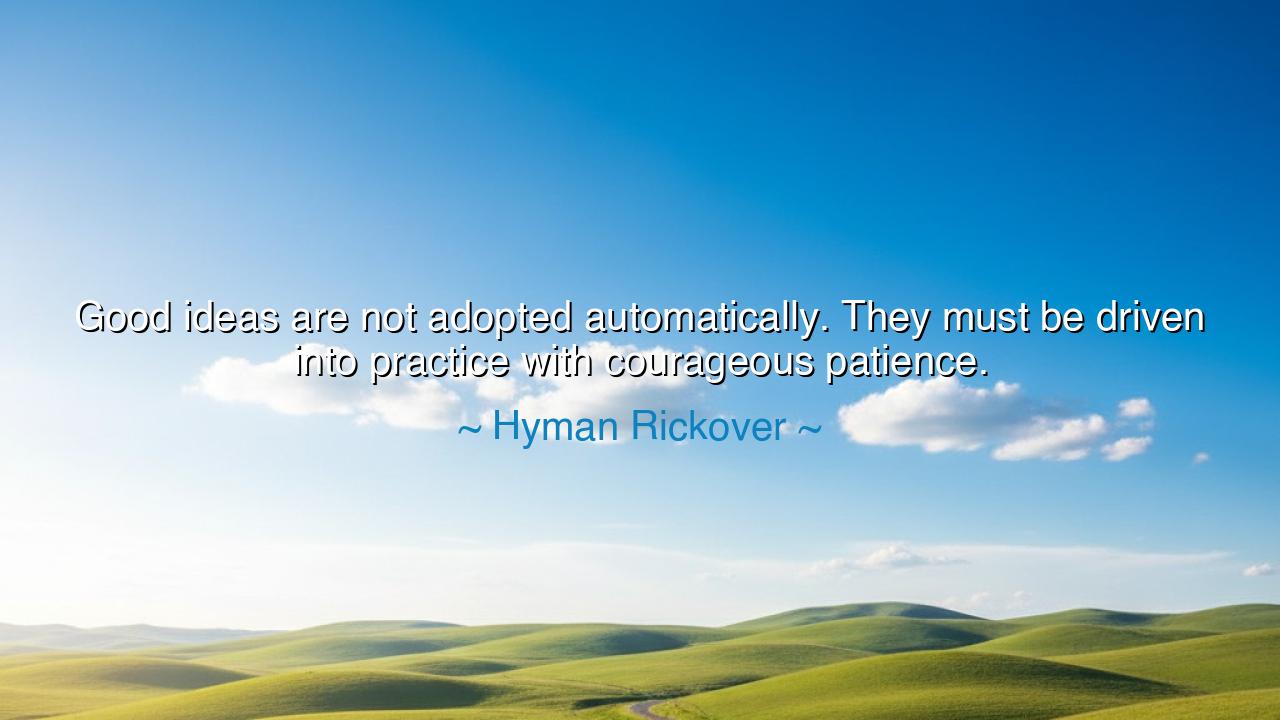
Good ideas are not adopted automatically. They must be driven
Good ideas are not adopted automatically. They must be driven into practice with courageous patience.






Behold the words of Admiral Hyman Rickover, a man known as the “Father of the Nuclear Navy.” He uttered a truth forged not merely in thought, but in the fires of experience: “Good ideas are not adopted automatically. They must be driven into practice with courageous patience.” This is not a fleeting maxim but a law of human endeavor, whispered across the ages. For ideas, however brilliant, are like seeds; they do not sprout by themselves upon stony ground. They must be nurtured, protected, and pressed into the soil of reality with both courage and patience.
The origin of this wisdom lies in Rickover’s own battle against inertia and doubt. When he sought to build the first nuclear-powered submarine, many scoffed. The idea was too daring, too costly, too untested. Yet Rickover, armed with vision, refused to let the idea remain only a dream. He bore the resistance of bureaucracy and the weight of skeptics. With unyielding patience and relentless resolve, he turned vision into steel and water. The USS Nautilus, launched in 1954, was the living proof that courage joined with patience could change the course of history.
Let the young and the old alike take heed: a good idea is rarely embraced instantly. The crowd resists the unfamiliar. Leaders cling to the comfort of the known. Many are blind to the fruits of tomorrow, choosing instead the security of today’s harvest. Thus, the bearer of an idea must stand as a guardian, refusing to abandon it when met with mockery or indifference. He must endure the cold winds of doubt until the spring of recognition finally arrives.
Consider the tale of Galileo. When he proclaimed that the earth moved around the sun, his idea was met not with applause, but with condemnation. His truth was locked away, his voice silenced. Yet others, moved by his courage and inspired by his patience, carried forth the flame of his vision. Centuries later, what was once heresy became the bedrock of science. Here too we see Rickover’s words made flesh: patience and courage are the twin shields with which one must protect a great idea.
But let none mistake patience for passivity. True patience is not idle waiting; it is the active endurance of hardship, the discipline of steady progress, and the courage to rise after each fall. Without courage, patience decays into resignation. Without patience, courage collapses into recklessness. Only together can they turn vision into achievement.
For the generations that follow, the lesson is clear. If you carry within you a good idea, do not expect the world to bow before it. Instead, prepare to labor long, to defend it against both silence and scorn. Equip yourself with courage to face opposition and with patience to endure delay. Your idea is like a flame in a storm; only with both strength and endurance can you keep it alive until others gather to its warmth.
Let each of us, therefore, act with the heart of a gardener and the soul of a warrior. Water your vision daily. Shelter it from the frost of disbelief. Stand firm when the winds of rejection howl against you. For one day, if you persist, your idea may blossom into a tree under which generations yet unborn may find shade and sustenance.
Thus I say to you: take Rickover’s words into your heart as a commandment of life. Do not despair when your vision is slow to take root. Do not abandon it when the world turns its back. Press it forward with courageous patience, and in time, what was once invisible to all will stand as a monument to your endurance. For history belongs not to the dreamers alone, but to the steadfast who make dreams flesh.






AAdministratorAdministrator
Welcome, honored guests. Please leave a comment, we will respond soon